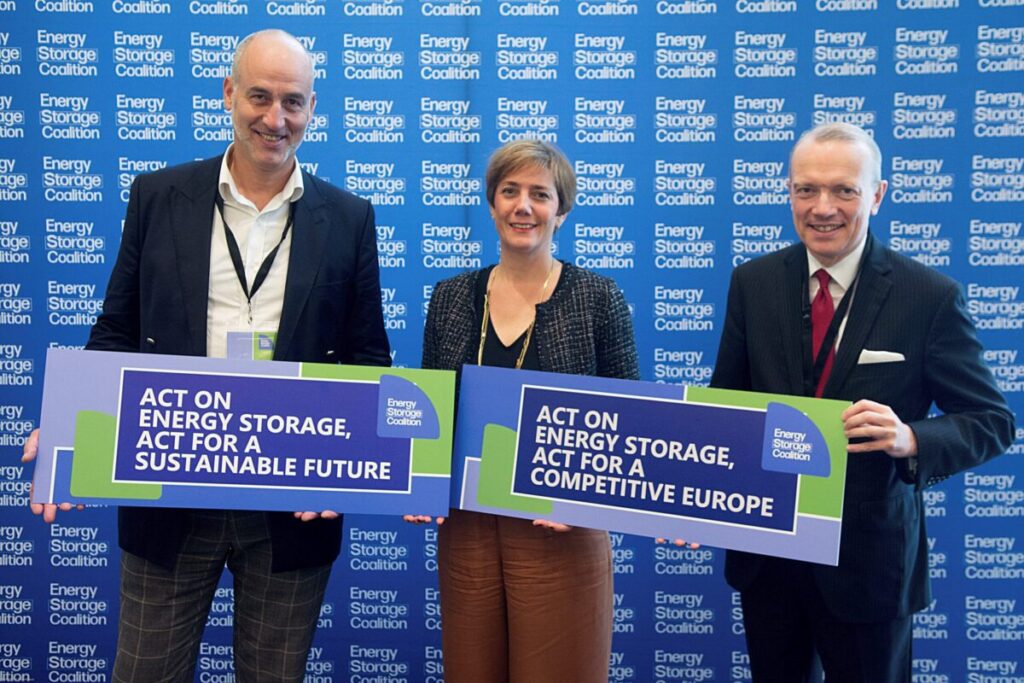
The European Union’s transition to a renewable-energy-powered electricity grid will fail unless it does more to support and promote energy storage, according to the Energy Storage Coalition.
The Energy Storage Coalition is campaigning for the European Commission (EC) to adopt an ‘Action Plan on Energy Storage’, believes that regulatory clarity and encouragement are needed for member states to invest in storage.
The Coalition brings together three pan-European trade groups in renewable and clean energy: SolarPower Europe, The European Association for Storage of Energy (EASE) and WindEurope, in addition to the Bill Gates-founded sustainability venture capital (VC) organisation Breakthrough Energy.
Its call for an action plan comes as a new five-year term begins for EU institutions, following European Parliament elections, which took place in June.
Try Premium for just $1
- Full premium access for the first month at only $1
- Converts to an annual rate after 30 days unless cancelled
- Cancel anytime during the trial period
Premium Benefits
- Expert industry analysis and interviews
- Digital access to PV Tech Power journal
- Exclusive event discounts
Or get the full Premium subscription right away
Or continue reading this article for free
While acknowledging that advances have already been made at EU level through the Green Deal Package legislation and Electricity Market Reform regulatory proceedings, and the European Parliament in 2020 called for an energy storage strategy to be implemented across the bloc, the Coalition said significant barriers to investment and deployment still remain.
Coalition invites energy transition companies to join campaign
It has outlined five minimum requirements for what such a plan should contain, including incentive programmes, dedicated energy storage auctions, and that EU member states’ National Energy and Climate Plans (NECPs) should be monitoring progress in energy storage adoption and deployment.
The Coalition has invited companies involved in the energy storage transition to sign up and make their voices heard through its campaign.
“The success of the energy transition depends on energy storage and renewables working together,” said Doriana Forleo, executive director of the Energy Storage Coalition.
Regulatory guidance and incentives still needed after ‘great step forward’ of EMD
Forleo said that the reformed Electricity Market Design (EMD) that the EU voted to adopt in March 2023 was a “great step forward.” However, both regulatory guidance and targeted incentives are still needed to “unlock the full potential of energy storage across the EU,” the Coalition executive director said.
In a recent article for our quarterly journal, PV Tech Power (Vol.40), Julian Jansen and Lars Stephan, markets and policy directors for energy storage technology company Fluence, noted that the EMD introduced the concept of electricity system flexibility to the EU for the first time.
It meant that EU member states must provide assessments of flexibility at five-year intervals, which would, in effect, mean analysing the benefit of energy storage as a key flexibility tool and foster its integration.
However, mirroring the Energy Storage Coalition’s comments, Fluence’s Jansen and Stephan wrote that barriers still remain, such as the levying of fees onto energy storage system operators twice for grid participation, once when charging and once when discharging: so-called ‘double-charging’ or ‘double-taxation’.
There are some incentive schemes for storage in individual countries, particularly through EU responses to the pandemic and the Russian invasion of Ukraine—most recently seeing the European Commission approve a 5.4GWh support scheme in Poland and a 1.2GWh scheme in Lithuania—but the Coalition wants to see more widespread incentive frameworks.
Similarly, while some countries, such as Italy, have already introduced capacity market auctions that make energy storage eligible as a low-carbon capacity resource, and others, such as Germany, have said they will start auctions soon, the Energy Storage Coalition argued that this needs to happen on an EU-wide level.
Indeed, while Europe’s adoption of energy storage has proliferated in the past couple of years, with 10GWh of mostly residential batteries installed in 2023, experts from EASE and consultancy LCP Delta said earlier this year that there is a big mismatch between the speed of deployment and the overall need for storage on the system.
1.2TWh of energy storage would save €160 billion in solar integration costs by 2040
The Coalition’s five essential elements for an action plan are:
- Dedicated incentives for energy storage should be introduced
- Permitting and grid connection rules for energy storage must be harmonised across the EU
- A fair framework for charges and levies for using the electricity network must be put in place
- Capacity markets should prioritise energy storage and dedicated auctions for energy storage and flexibility launched
- EU member states’ NECPs should monitor the growth of energy storage
CEO of Coalition member SolarPower Europe Walburga Hemetsberger cited a recent report commissioned by the PV trade association, Mission Solar 2040, which estimated that meeting EU solar energy targets would require 1.2TWh of energy storage.
This would also save the EU and its taxpayers €160 billion (US$173.66 billion) in system costs by 2040, Hemetsburger said, adding that this will not be achieved without an action plan on energy storage.
“The action plan is about pushing renewables and storage forward, attracting investments and ensuring Europe’s energy security,” EASE secretary general Patrick Clerens said.
“An energy storage action plan is the right way forward to achieve the decarbonisation objectives, ensure Europe’s competitiveness, and reach low energy prices for all consumers.”





